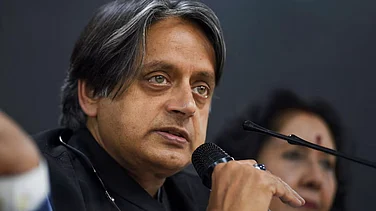The Maharashtra government on Tuesday announced a new housing policy, which includes a comprehensive programme ranging from slum rehabilitation to redevelopment, with an investment of Rs 70,000 crore besides focusing on low-income groups and affordability.
Talking to reporters after a cabinet meeting where the policy was approved, Chief Minister Devendra Fadnavis said the policy focuses on housing for the common man with the motto "My Home -- My Right".
He stressed the policy prioritises low-income groups, senior citizens, women, industrial workers and students.
The policy comprises a comprehensive programme from slum rehabilitation to redevelopment, with an investment of Rs 70,000 crore.
The chief minister said affordable and inclusive housing for working women, senior citizens and students have been considered, and issues of rental housing and creating land banks have been addressed.
''All stakeholders and schemes will be brought on a single portal, 'Maha Awaas'. Government land parcels will be mapped and made available for housing. Sustainability will be an important factor in housing and will be brought in with modern technology. This is for the first time since 2007 that a comprehensive and dynamic all-inclusive policy has been formulated,'' he maintained.
He said vertical slums and SRA (Slum Rehabilitation Authority) buildings are being given incentives.
Fadnavis emphasised that the new policy takes into account the housing needs of urban and rural areas.
Deputy Chief Minister Eknath Shinde, who holds the housing portfolio, described the new policy as "revolutionary" and added it aims to provide affordable homes and give a major boost to the state's economy.
Speaking to reporters, Shinde said the path to affordable housing for common citizens and economically weaker sections in Maharashtra has been cleared through the policy.
The policy will transform urban development and the housing sector in the state. Flow of large-scale investments in the key sector will significantly boost Maharashtra's goal of becoming a USD 1 trillion economy by 2032, the housing minister opined.
The State Housing Policy 2025 with the slogan "My Home -- My Right" will prove decisive in providing affordable, sustainable, inclusive residences for all sections of society, especially the economically weaker and low-income groups, he said.
The state government has set a target of building 35 lakh homes by 2030 for these groups, with specific provisions designed to meet the unique needs of every segment.
Speaking about the key features of the policy, Shinde said housing needs of senior citizens, working women, students, industrial workers, journalists, persons with disabilities, and ex-servicemen have been considered.
A centralized state housing information portal will be developed using artificial intelligence. It will coordinate data on housing demand and supply, geo-tagging of housing units, fund distribution, district-wise land banks, and integration with platforms like MahaRERA, MahaBhulekh, and PM Gati Shakti, Shinde informed.
Under the policy, a land bank of government-owned plots suitable for residential use will be created. This state-wide land bank will be developed by 2026 through coordination with departments like revenue, forest, MSRDC (Maharashtra State Road Development Corporation), MIDC (Maharashtra Industrial Development Corporation) and water resources.
The policy emphasizes on developing housing near employment centres, particularly in industrial zones, aligning with Prime Minister Narendra Modi's "walk-to-work" vision. Of the 20 per cent land reserved in MIDC areas for utility purposes, 10 to 30 per cent will be earmarked for residential use.
Recognizing the trend of rapid urbanization, all metropolitan region development authorities, not just corporations with populations over 10 lakh, have been instructed to implement inclusive housing schemes.
A dedicated self-redevelopment cell has been proposed to guide housing societies through planning, funding, developer selection, and execution. An initial fund of Rs 2,000 crore will be allocated.
The policy seeks to promote green building practices, sustainable infrastructure and climate resilient construction techniques.
It proposes using central government land for slum rehabilitation projects. Joint efforts between the central government and the SRA can be undertaken.
The policy emphasizes on transparency, real-time monitoring, and accountability through IT-based systems, ensuring tracking of beneficiaries, project progress, and fund management.
It aims to promote cluster redevelopment as a strategic approach. For slum rehabilitation schemes that haven't progressed, new developers will be selected under the policy through a transparent bidding process.
Shinde emphasised that delays will be avoided, and malpractices will be completely eliminated.














